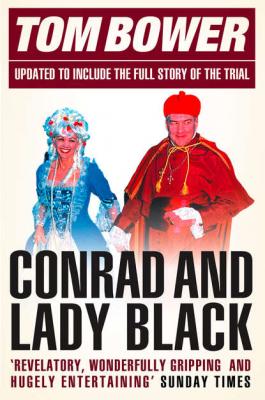ТОП просматриваемых книг сайта:
Conrad and Lady Black: Dancing on the Edge. Tom Bower
Читать онлайн.Название Conrad and Lady Black: Dancing on the Edge
Год выпуска 0
isbn 9780007388868
Автор произведения Tom Bower
Жанр Биографии и Мемуары
Издательство HarperCollins
Under the management of Andrew Knight and Max Hastings, the Telegraph’s losses of £15 million in 1986 were transformed in 1987 into a small profit. The paper’s circulation began to increase, and Black bought the conservative weekly the Spectator from the Australian Fairfax Group, which had plunged into financial crisis. Hollinger’s shares in Canada soared as the value of Black’s coup and Rupert Murdoch’s victory in Wapping became evident. ‘I want to build a first-class newspaper company,’ Black told a London newspaper, and added, ‘I am not a seeker after status here,’ denying his expectation of a peerage. No one cast doubt on his claim to possess assets worth C$650 million, and no one queried the huge loans against which he had used his assets as collateral.8 Although Black was wealthy, he lived in a comparatively modest home in Hampstead, and while his journalists shared some of the profits, there were limits. Journalists who compared his income with their own when asking for a pay increase were lampooned. ‘I earn a lot because I’m a capitalist,’ he said gleefully, ‘and you are a seeker after the truth.’
In the summer of 1987 the Telegraph moved from Fleet Street to South Quay in London’s Docklands. Under Knight’s plan, the company’s 2,200 printers would be reduced to 507 men supervising automated machines and robots, while the 413 men currently employed to compose the hot metal plates would be replaced by twenty-seven technicians. If the plan succeeded, the Telegraph’s profits in 1988 were projected to rise to £29 million. At that moment, the first fissure in Black’s hitherto unruffled performance opened. ‘They’re mad,’ Dan Colson told him. ‘Don’t let them de-man. There’ll be strikes.’ Colson had assumed a special role in Black’s business, but Knight was appalled by his interference. ‘You’ve got to back myself and the management,’ Knight insisted during a telephone call to Canada. Without an alternative, Black agreed. The redundancies were achieved without strikes, and the Telegraph’s annual profits were projected to rise to £40 million.
This was the beginning of Conrad Black’s halcyon era, and he was flying. His income from the Telegraph, and the prospect of selling his 5 per cent stake in the Southam newspaper group in Canada at a considerable profit, reinvigorated his appetite for deals and expansion. In that atmosphere, he decorated his new office in Docklands with the symbols of tyrants and inspirational leaders, including busts of Cardinal Newman and Napoleon. Few could understand his fascination for the ruthless French warmonger, but the media’s attention to his passion for a despot tickled Black’s self-importance. ‘I’ve never found him an attractive personality,’ Black said about Napoleon, while admitting his fascination for ‘a great talent … a military commander and a mythmaker’.9 Hero-worship fed Black’s illusion of his own growing importance among the world’s leaders.
At the 1987 Bilderberg conference by Lake Como in Italy, hosted by Gianni Agnelli, the chairman of Fiat, Black was treated like a head of state, speeding around the area with a police escort. For the next twelve months, in anticipation of the leaders of the Group of Seven countries’ meeting in Toronto, Black assiduously cultivated Margaret Thatcher. 22 June 1988 was his red-letter day. In her speech to the Ottawa Parliament in the morning, Thatcher praised Black as the most important Canadian in London. That evening she appeared as guest of honour at the Hollinger annual dinner. Surrounded by Canada’s elite, Black introduced the world-famous leader, and in reply Thatcher praised her host as a star who was continuing the tradition of Canadians in Fleet Street, mentioning Lord Beaverbrook and Lord Thomson. After great applause, Thatcher was in turn thanked by Henry Kissinger, who also referred to Black in glowing terms. No one could ignore that night’s adulation of their host. Certainly, Black believed, his fellow countrymen would be persuaded to forget their earlier slurs. He anticipated a peerage and much more. He had already called at 10 Downing Street and asked Charles Powell, ‘What does one have to do to get a peerage?’ Unfortunately, Powell had not been helpful, so Black put out feelers among Thatcher’s advisers. His peerage, he believed, would not take long. Like Roy Thomson, he too might be posthumously remembered in St Paul’s Cathedral, although he was unsure whether Thomson’s commemorative plaque in the crypt – ‘He gave a new direction to the British newspaper industry. A strange and adventurous man from nowhere, ennobled by the great virtues of courage and integrity and faithfulness’ – would do him sufficient justice. Only Hal Jackman, bemused by Hollinger paying a fortune to entertain politicians, offered a reality check. ‘Why do you have all these people for dinner, Conrad?’ he asked. ‘Good for business,’ replied Black. ‘More like social climbing,’ laughed Jackman.
Конец ознакомительного фрагмента.
Текст предоставлен ООО «ЛитРес».
Прочитайте эту книгу целиком, купив полную легальную версию на ЛитРес.
Безопасно оплатить книгу можно банковской картой Visa, MasterCard, Maestro, со счета мобильного телефона, с платежного терминала, в салоне МТС или Связной, через PayPal, WebMoney, Яндекс.Деньги, QIWI Кошелек, бонусными картами или другим удобным Вам способом.

